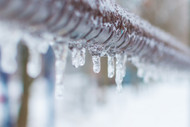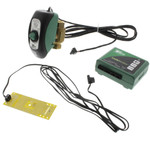Winter Plumbing Tips to Protect Your Pipes
Taking every winter plumbing precaution is critically important to prevent in-home disasters when the temperature drops below freezing.
When the water in your pipes freezes, it expands and creates a buildup of pressure. In a best case scenario, the buildup of ice in your pipes will prevent water from flowing through your faucets. At worst, your pipes can burst and spill hundreds of gallons of water into your home, causing thousands of dollars of damage.
It’s recommended to winterize your plumbing well before the temperature starts to drop, especially if you’re planning on going away for vacation over the holidays. Vacant homes are at the highest risk for plumbing disasters.
Below, we offer some professional plumbing advice that will help you avoid costly repairs, insurance claims, and stress this winter and for many winters to come.
Plumbing Maintenance Tips
There are two ways to winterize a house’s plumbing. If you are going on vacation, you’ll want to winterize your pipes by emptying them of water completely. Or, you can take precautions to prevent your pipes from freezing while you’re at home. It doesn’t take long for pipes to freeze - it can happen as quickly as overnight.
How to winterize your pipes before leaving for vacation:
- Start by making a list of every faucet and valve in your home.
- Turn off your main water valve, water pump, and water heater. Turning off your water heater will ensure it doesn’t burn out while it’s empty.
- Open all valves and taps in your home so the pipes can empty completely. Double check your list to make sure you haven’t forgotten a valve or faucet. If you leave a tap closed, it will create a vacuum that will hold water in the pipes. Vacuum breakers can also help prevent pressure buildup. Cartridges in shower trims and faucets will likely need to be removed in order to fully clear the systems of water.
- Use an air compressor to make sure no water is left behind.
- Empty your hot water tank. If your tank doesn’t have a floor drain you will need to attach a garden hose and run it outdoors.
- Drain the holding tank and make sure the rubber diaphragm is empty. Add antifreeze to the jet pump case.
- Flush all toilets. If they cannot be completely emptied, pour antifreeze into the tank.
- Put antifreeze into any drain trap to prevent cracks.
How to prevent your pipes from freezing:
- Locate the most vulnerable pipes in your home - exterior pipes, uninsulated pipes, and pipes that are in spaces that are not heated. Plastic pipes are less vulnerable than copper or steel pipes.
- Apply insulation sleeves to vulnerable pipes and double check to make sure there aren’t any gaps in the insulation.
- Check the exterior walls for cracks where cold air can enter your home. If you find any cracks, seal them with spray foam or caulk.
- Do not turn your heat off when the temperature is below freezing. You can lower the temperature if you plan to be away from home, but make sure that no part of your home is at risk of getting near freezing.
- If temperatures are extremely low, leave faucets dripping overnight and when your home is empty during the day for long periods of time.
- If you have a crawl space, make sure it is well insulated.
- Use a WiFi Water Leak and Freeze Detector so you can be aware of leaks and temperature drops as soon as they happen.
Call Plumbing Deals for Assistance with Winterizing Your Home
We can advise how to keep your home and family prepared with our stock of winter-resistant quality plumbing supplies at reasonable prices. Please contact us at any time.




